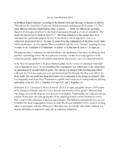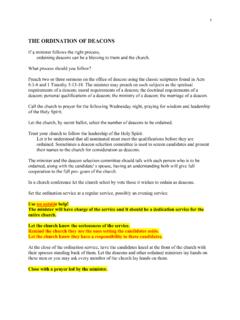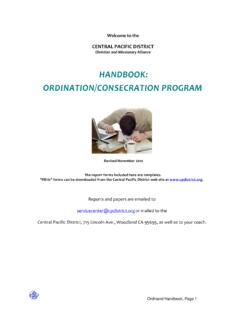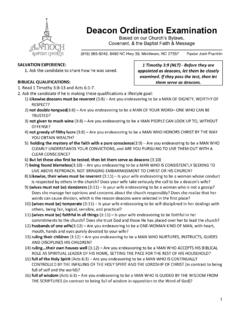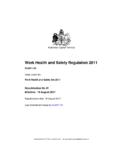Transcription of National Award for SEN Co-ordination
1 National Award for SEN Co-ordination Learning Outcomes FINAL 2 Contents Introduction 3 Learning outcomes: 6 Part A. Professional Knowledge and Understanding 6 Part B. Leading and Coordinating Provision 7 Part C. Personal and Professional Conduct 8 3 Introduction The Special Educational Needs Code of Practice (2013/14) requires governing bodies of maintained mainstream schools and the proprietors of academy schools (including free schools) to ensure that there is a qualified teacher designated as Special Educational Needs (SEN) co-ordinator (SENCO) for the school. The Code of Practice envisages that the SENCO will provide leadership and professional guidance to colleagues and will work closely with staff, parents and carers, and other agencies.
2 It challenges SENCOs to promote person-centred, inclusive, practice in which the interests and needs of pupils with SEN and/or disabilities are at the heart of everything that they do. The SENCO should be aware of the provision in the Local Offer and be able to work with professionals providing a support role to the family to ensure that children with SEN receive appropriate support and high quality teaching, make at least good progress and achieve good outcomes. Where a SENCO appointed after 1st September 2008 has not previously been the SENCO at that or any other relevant school for a total period of more than twelve months, they must achieve the National Award for Special Educational Needs Coordination within 3 years of appointment.
3 Schools must satisfy themselves that their SENCO is equipped for the role. They will decide how best to secure and fund appropriately accredited training within the rubric of nationally agreed learning outcomes that provide the framework within which to address key aspects of the SENCO role while taking account of the local context. At the same time, training providers are expected to use the learning outcomes as a basis upon which to develop, validate and deliver programmes that respond to schools needs. The Award must be validated at post-graduate level by a recognized awarding body. Since it was first introduced, approved providers have been required to validate the Award at masters-level and offer 60 credits.
4 Experience to date suggests that it would be difficult to achieve the aims of the Award at a lower level. The Masters degree characteristics (QAA, 2010) provide the benchmark that training providers use in designing masters-level programmes. In particular, the exemplar for a professional/practice masters suggests that graduates should typically have: i) Subject-specific attributes: An in-depth knowledge and understanding of their profession, informed by current practice, scholarship and research, including a critical awareness of current issues and developments in the subject and the profession; The ability to apply research to professional situations, both practical and theoretical; The ability to use a range of techniques and research methods applicable to their professional activities.
5 Ii) Generic attributes (including skills relevant to an employment-setting) that include the ability to: Use initiative and take responsibility; Solve problems in creative and innovative ways; 4 Make decisions in challenging situations; Continue to learn independently and to develop professionally; Communicate effectively, with colleagues and a wider audience, in a variety of media. Master s-level programmes are typically delivered through a combination of methods best suited to the purpose of the programme and the student s particular circumstances and needs. However, evidence of what makes leadership development effective suggests most programmes will consist of a blended approach that involves some or all of: Workplace learning and practical activities; Face to face activity, including peer and facilitated learning; Reading and reflection; On-line learning; Projects or other pieces of work at Master s level The learning outcom es hav e be en developed in the context of t he T eachers Standards, which apply to SENCOs in the same way as other teachers and have been structured in a manner similar.
6 However, they should not be interpreted as professional standards. SENCOs undertaking further specialist training will already be skilled teachers who hav e demonstrated the professional attributes, professional knowledg e an d understanding, and professional skills set out in the Qualified Teacher Stat us and the Teachers Standards as a minimum. Achieving the learning outcomes should enable new SENCOs to fulfill th e leadership role set out in the Code of Practice, the key f eatures of which are: Overseeing the day-to-day operation of the school s SEN policy; Coordinating provision for children with SEN; Liaising with the relevant designated teacher where a looked after pupil has SEN; Advising on a graduated approach to providing SEN Support; Advising on the deployment of the school s delegated budget and other resources to meet pupils needs effectively; Liaising with parents of children with SEN.
7 Liaising with other schools, educational psychologists, health and social care professionals, and independent or voluntary bodies; Being a key point of contact with external agencies, especially the LA and LA support services; Liaising with potential next providers of education to ensure a young person and their parents are informed about options and a smooth transition is planned; Working with the head teacher and school governors to ensure that the school meets its responsibilities under the Equality Act (2010) with regard to reasonable adjustments and access arrangements; Ensuring that the school or maintained nursery keeps the records of all children with SEN up to date.
8 The learning outcom es are specific to the SENCO role and relevant to SENCOs in all schools but some aspects will need to be interpreted differently according to the phase, 5 siz e and type of school or other work setting such as a pupil referral unit, children s centre or other early years setting. SENCO training must help SENCOs to demonstrate that they are able to meet the learning outcom es and providers must assure themselves that SENCOs meet all of the outcom es by the end of the programme in order to be awarded the National SENCO qualif ication (The National Award for Special Educational Needs Coordination). The learning outcomes are structured in 3 parts: Part A The professional knowledge and understanding that SENCOs need of the legislative context for SEN and theoretical concepts that underpin effective leadership and practice.
9 Part B The expertise and capabilities that SENCOs need to lead and coordinate provision effectively. Part C The personal and professional qualities that SENCOs need to make a positive impact on the ethos and culture in schools and other settings. 6 Learning outcomes: Part A: Professional Knowledge and Understanding The Award should enable SENCOs to know a nd understand the implications of: 1. The statutory and regulatory context for SEN and disability equality and the implications for practice in their school or work setting Guidance within the SEN Code of Practice and how it is interpreted locally; Mediation and the SEND Tribunal; The Local Offer; OfSTED Frameworks relevant to their school or work setting; New funding models, including the right to personal budgets; The policy and legislative context for health and social care, including safeguarding and the health and well-being agenda; Relevant guidance on data protection and confidentiality , health and safety , including governor accountabilities.
10 2. The principles and practice of leadership in different contexts: The characteristics of highly effective leadership; Leadership and management processes and tools that support change in schools; The role of leadership and professional challenge in supporting and promoting a culture of continuous professional development linked to improvement; Their own leadership, including strengths and areas for development; The professional qualities of effective team leadership. 3. How SEN and disabilities af fect pupils participation and learning The breadth and complexity of the causes of under achievement; How children s development is affected by SEN and/or disabilities, including mental health needs, and the quality of teaching they receive; High incidence SEN and their im plicat ions for teaching and learning and inclusive practice; Planning provision for children and young people with more severe and complex SEN.










